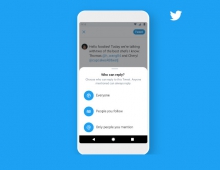
Security Firm Hacked Celebrity Accounts to Spur Twitter Fix
Insinia Security hijacked the Twitter accounts of a number of celebrities, including Eamonn Holmes, Louis Theroux, Simon Calder, Saira Khan and many more, in order to expose alleged flaws in the service.
In a blog, the firm said it managed the feat by analysing the way Twitter handles messages posted by phone. Knowing a person's phone number could let attackers send messages from accounts they do not control, it said.
It recommends that Twitter users remove their phone number from their accounts as a precaution.
Other celebrities whose accounts it temporarily hijacked included the travel journalist Simon Calder and the TV presenter Saira Khan.
Insinia faced criticism for its latest attempt to publicise the issue, since the attack was done without any permission from the Twitter account owners. Although security firms commonly perform such "proof of concept" actions, they could be considered as a breach of the Computer Misuse Act.
Mike Godfrey, chief executive of Insinia, said his firm had only "passive interaction" with the Twitter accounts it targeted and denied it had broken the law.
"We have not had access to any Twitter account and have not seen any of their direct messages.
"There's nothing unethical or irresponsible about what we did."
Insinia reassured victims of its demonstration in a tweet saying "The user of this account has not lost access to it, no data compromised and is not under attack".
Inisina said it had managed to inject its messages onto the targeted accounts by analysing the way the social network interacted with smartphones when messages are sent.
Knowledge about this process, coupled with publicly available information on Twitter's text message policies and a target's phone number allowed the security firm to post messages that appeared to come from the account's real owner.
Inisina has called on Twitter to issue a fix saying the vulnerability could be exploited to send fake news or spread disinformation.
Additionally, it said, the shortcomings could be used to "send direct messages to trusted contacts in the victim's network to socially engineer people into clicking links that will install advanced malware to remotely control devices".
Anyone worried that they might fall victim to this kind of spoofing attack should remove their phone number from their Twitter account, it added.





















